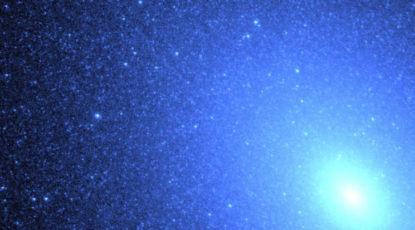-
Space weather disrupts nocturnal bird migration, study finds
Birds and other animals rely on Earth’s magnetic field for long-distance navigation during seasonal migrations. U-M researchers are now learning how periodic disruptions of the planet’s magnetic field, caused by solar flares and other energetic outbursts, affect the reliability of those biological navigation systems.
-
An eye on the sky
The Extremely Large Telescope (or ELT) could change everything we know about the universe — including how the first galaxies were created and where life on other planets may exist. And U-M is the only U.S. university involved in helping develop it.
-
Milky Way’s long-lost sibling finally found
U-M scientists have deduced that the Andromeda galaxy, our closest large galactic neighbor, shredded and cannibalized a massive galaxy two billion years ago.
-
Not your father's time capsule
Students prepare to launch a time capsule into orbit to mark U-M’s bicentennial. The plan is to retrieve it in 100 years.





